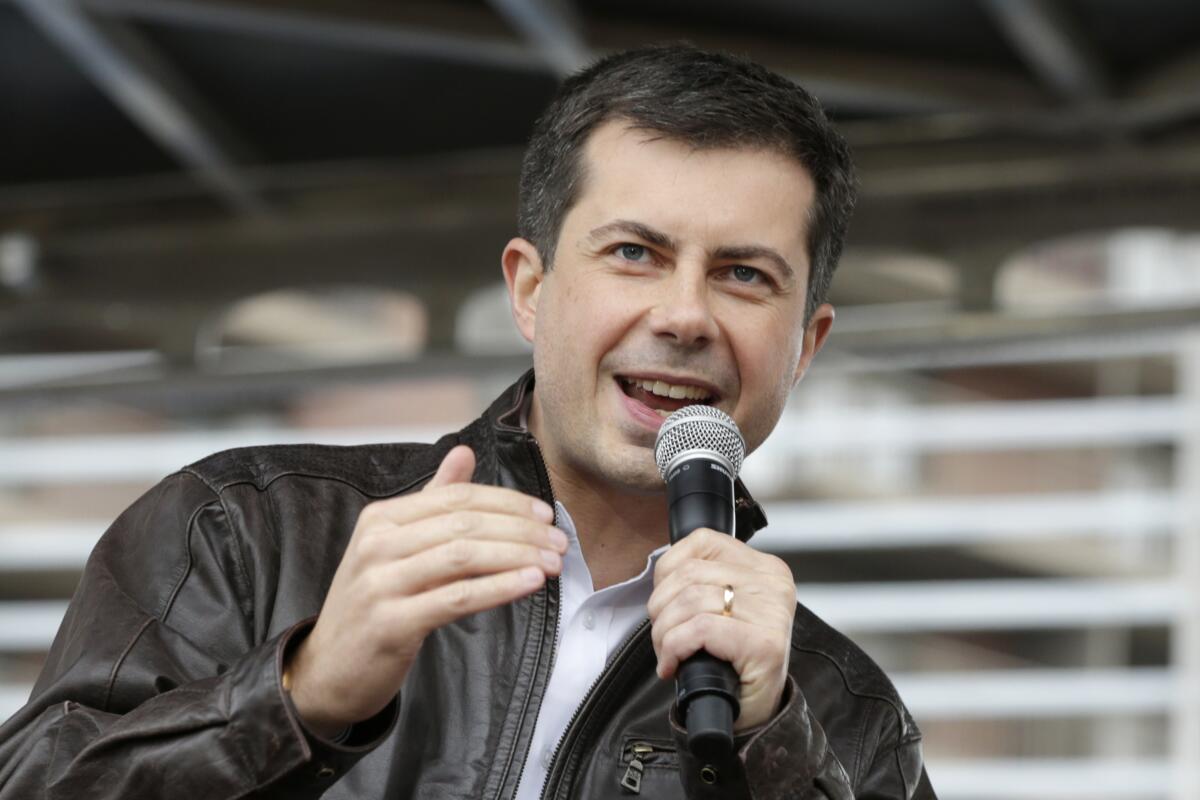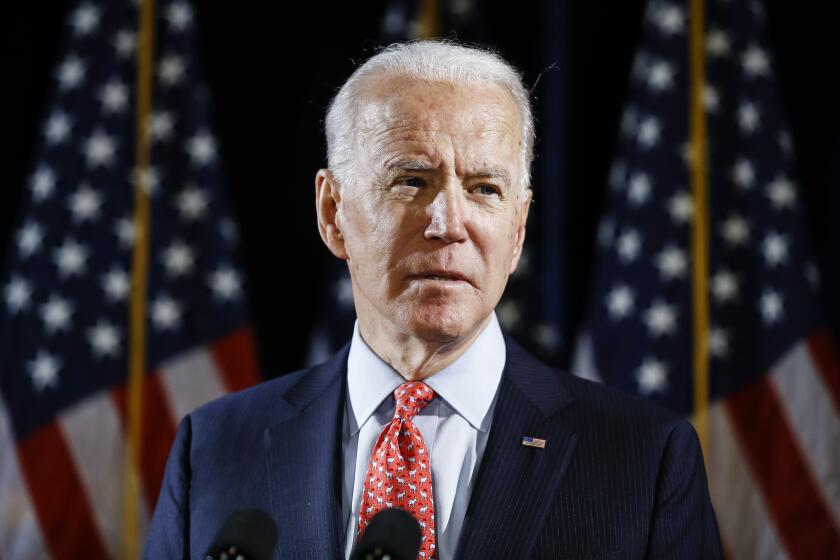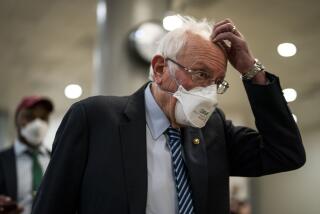Michael Bloomberg joins Democrats’ 2020 race for president
- Share via
Billionaire and former New York City Mayor Michael R. Bloomberg joined the race for the Democratic presidential nomination Sunday, adding new uncertainty to the party’s already unsettled contest to pick President Trump’s challenger in 2020.
After more than a decade of exploring a White House run, Bloomberg, one of the richest men in the world, enters the race with a huge financial edge over his Democratic rivals — but also with big vulnerabilities. The former Republican is banking on the collapse of Joe Biden’s candidacy, casting himself as a steadier and more viable moderate than the former vice president.
“We cannot afford four more years of President Trump’s reckless and unethical actions,” Bloomberg said on his campaign website. “He represents an existential threat to our country and our values. If he wins another term in office, we may never recover from the damage.”
Bloomberg’s advisors acknowledge he is starting too late to compete effectively in the states that will hold the party’s first four nominating contests in February: Iowa, New Hampshire, Nevada and South Carolina.
But Bloomberg will have a virtually unlimited budget to advertise in California and more than a dozen other states that hold Super Tuesday contests March 3. He is spending at least $31 million on a week of television advertising starting Sunday in New York, Los Angeles, Chicago and dozens of other cities across the nation.
“He has the ability financially to flood the airwaves and digital media,” said Dean Spiliotes, a Southern New Hampshire University politics professor who is skeptical of Bloomberg’s potential. “He’s going to be criticized for trying to buy the election, for sure.”
In his first TV commercial, Bloomberg is cast as a businessman who “took charge of a city still reeling from 9/11” and “helped bring it back from the ashes.”
Bloomberg promises higher taxes on the rich but offers no specifics in the ad. In the past, he has criticized the proposal of Democratic rival Elizabeth Warren, a Massachusetts senator, to impose a new tax on the assets of Americans with personal fortunes of more than $50 million.
Bloomberg also makes clear in the ad that he rejects the “Medicare for all” plans of Warren and Vermont Sen. Bernie Sanders, the two leading progressives in the Democratic field. He says he would ensure that “everyone without health insurance can get it and everyone who likes theirs” can keep it.
Polls have consistently found most Democrats are satisfied with their current roster of candidates. Nonetheless, Bloomberg is not the only one to make a late entry: Former Massachusetts Gov. Deval Patrick joined the race this month.
Bloomberg had announced in March that he would not run for president, but he changed his mind after Biden’s candidacy started to falter and Warren and Sanders emerged as the most popular alternatives.
“This is a pipe dream,” said Democratic consultant Paul Maslin, who is unaligned in the White House race. “I just think it’s preposterous. You don’t win this thing by getting in late. You have to go out and earn it.”
Bloomberg said he would be “the only candidate in this race who isn’t going to take a penny from anyone and will work for a dollar a year.” His refusal to take campaign contributions could appeal to some voters, but it will effectively disqualify Bloomberg from participating in debates sanctioned by the Democratic National Committee. A broad donor base is one of the party’s criteria to get on the debate stage.
If Bloomberg’s candidacy gains traction, he could pose an especially serious threat to Pete Buttigieg. The mayor of South Bend, Ind., has positioned himself as a moderate with appeal to Democrats who fret that Warren and Sanders are too liberal to beat Trump in crucial battleground states. Buttigieg has surpassed Biden in recent polls of likely Iowa Democratic caucus voters.

Since Bloomberg left office as mayor six years ago, he has spent heavily on Democratic campaigns and causes, most notably on gun control and the fight against global warming. He mentioned both in his campaign announcement.
Still, some party strategists see an older white billionaire as poorly suited to inspire the diverse constituencies of Democrats who are yearning to oust Trump.
Bloomberg’s history of making boorish remarks about women and supporting police stop-and-frisk tactics risks alienating two of the party’s core factions: women and African Americans. Recently, at a black church in New York, Bloomberg apologized for mandating stop-and-frisk when he was mayor; he defended the tactic as recently as January despite its outsize effect on people of color.
The former New York mayor and Trump critic will have a steep climb in the 2020 Democratic primary contest if he decides to run. He would bet on winning later and larger states.
Warren and Sanders have made billionaires a prime target of their campaigns, saying the rich buy off politicians in Washington and harm Americans struggling to afford healthcare, college tuition and other day-to-day expenses. Another billionaire, former hedge fund chief Tom Steyer of San Francisco, declined to enter the race before — like Bloomberg — changing his mind. Steyer has been stuck near the bottom of the pack in both national and early-state polls.
Hugh Winebrenner, a political science professor emeritus at Drake University in Iowa, called Bloomberg’s candidacy a long shot, saying the former mayor will surely draw brutal attacks from opponents.
“They’ve been in there working their tails off, and all of a sudden he comes in and says, ‘Take me over them,’ and I suspect that’s not going to make some people happy,” Winebrenner said.
The field is down to Joe Biden now that Bernie Sanders ended his presidential campaign. Here is the Democrat heading for a battle with President Trump.
Minnesota Sen. Amy Klobuchar, another moderate in the Democratic race, told ABC News on Sunday that she’d had four town hall meetings in New Hampshire over the last couple of days and did not think voters would appreciate Bloomberg’s lavish spending on his candidacy.
“They’re not necessarily looking for the richest person,” she said, adding that Trump was “constantly talking about how much money he has.”
“They’re looking for someone different,” Klobuchar said.
Sanders campaign manager Faiz Shakir was more caustic.
“It’s disgusting that somebody who thinks that this is the way that you win a presidency, is you sit in your Manhattan sky-rise and pump out a bunch of advertising and that that’s the path,” he told NBC News.
Bloomberg’s candidacy creates an awkward conflict for his media holdings. John Micklethwait, the editor in chief of Bloomberg News, released a statement saying it would continue its tradition of not investigating Bloomberg, his family or his foundation and “will extend the same policy to his rivals in the Democratic primaries.”
“If other credible journalistic institutions publish investigative work on Mike or the other Democratic candidates,” Micklethwait said, “we will either publish those articles in full or summarize them for our readers — and we will not hide them.”
At the same time, he said, Bloomberg News “will continue to investigate the Trump administration, as the government of the day.”
Bloomberg Opinion will stop running unsigned editorials, he said, and several opinion editors, including Trump biographer Timothy O’Brien, will take a leave of absence to join Bloomberg’s campaign.
Bloomberg’s age is likely to be a campaign challenge: He is 77, nine months older than Biden, who turned 77 on Wednesday. The oldest Democrat in the race is Sanders, who is 78. Warren is 70, and Trump is 73.
“Just what the field needs, another septuagenarian,” Maslin said.
Bloomberg was a Democrat until 2001, when he registered as a Republican to run for mayor of New York City. He won the election and served three terms. Bloomberg abandoned the GOP in 2007 and became an independent. In October 2018, he registered again as a Democrat.
Bloomberg has been a staunch opponent of the tobacco and soft drink industries. His foundation has spent hundreds of millions of dollars to curb tobacco use in the developing world.
He made plans to run for president as an independent in 2016 but ultimately stayed out of the race. He has been a brutal critic of Trump, a fellow New Yorker who recently said there was no one he’d rather run against than “little Michael.” At the Democratic National Convention in 2016, Bloomberg described Trump as a “risky, radical and reckless choice” for president.
“I’m a New Yorker, and I know a con when I see one,” Bloomberg said.
Bloomberg, who grew up in the Boston area, was a Wall Street investment banker before he founded Bloomberg LP, the information technology and media company that produced his personal fortune. Forbes estimates his net worth at $54 billion.
More to Read
Get the L.A. Times Politics newsletter
Deeply reported insights into legislation, politics and policy from Sacramento, Washington and beyond. In your inbox twice per week.
You may occasionally receive promotional content from the Los Angeles Times.












